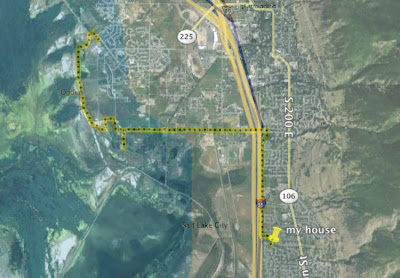Last President's Day I committed TWO grievous crimes against economic prudence. And then I committed one again today. I guess I didn't regret it enough to be truly repentant of my previous transgression.
Before you can understand the gravity of my actions, allow me to present a few economical practices that have proved beneficial to my financial existence.
I am always amazed at how people who make more money than I do seem to have less of it. Rather, I should say, I am amazed at how dumbfounded (emphasis on the dumb part) those people are that they don't have more money. Well, they don't have more money because they spend it all, and they typically spend it unwisely. It's basic addition and subtraction that they apparently didn't learn very well in elementary school, but I will admit that it does go beyond simple math. There is some common sense involved, which turned out is not so common at all. That's the unwisely part.
Priorities and value determine much of that. But there are very simple things people can do to have their cake and eat it too:
- Plan menus and cook meals around what is on sale. Most people want to eat a certain dish, and they go out and buy the ingredients at full price. Look at the weekly ads; some weeks have especially good sales. The results of this can be compounded with the following.
- Make your own meals; don't eat out frequently. Restaurants pay wholesale prices for their food; the actual dishes are very cheap to make. You pay for the overhead. Make yourself a meal, and you can give yourself a generous tip with your savings.
- Take advantage of a good deal—know what a good deal is and know prices/value. Looking at the ads regularly will also give you a better idea of what a good deal is. But don't be fooled: some stores will advertise something at a "special" price, but that doesn't mean it is a good deal. (I also like to compare prices to prices at Costco. If an item is cheaper than it is at Costco, it is usually a good deal.)
- Use coupons. There is no shame in using coupons. The trick to using coupons is not to buy things you don't need just because you have a coupon. (See below.) That's how companies suck you in. The other trick is to know whether the value of the coupon will reduce the price enough such that it is as good or better than a weekly sale. Better yet, use the coupon for an item that is also on sale. It happens frequently but maybe not as conveniently.
- Don't pay for things you don't need or use. This exercise does not require further explanation, but for the fun of it, I will provide an example: I don't watch TV. I don't have the time. Yet, I've been paying for TV service, and I have been paying for it for the sake of my roommate, who has been with me for over three years now. Well, my service provider now requires some box to get service. I don't even have the time or I don't want to spare the time to set up an appointment to get the box because it makes no difference to me whether I have the box or not because I don't watch TV. I asked myself why then am I paying for it. I brought up the issue with my roommate, and she was confounded that I would ask her to pay for her own TV service. I figured that I have wasted $1,800 over three year on a service that I have not used. Believe me, I'm giving myself a very disapproving look.
- Comparison shop. If something is cheaper somewhere else, get it where it is cheaper. Recognize, though, that if you have to go clear across town, the gas/time spent increases the supposed cheaper price. Estimation and basic math is sufficient to determine the proper choice. This goes along with the following practice.
- Travel efficiently. Go to the store on your way to or from work or while out doing other errands. There is no sense in going home just to go back to where you just were. I go to work straight from the gym. It saves me 12 miles and about 20 minutes.
- Don't buy on impulse. I think it was Jean Chatsky, financial editor on NBC's Today Show and former partner when I worked at FranklinCovey, who recommended thinking about something for a full 24 hours before buying. If you still want it after 24 hours, you are more likely not to regret the purchase.
(Tangent: This is somewhat related to a presentation my friend recommended that is interesting enough to share. (Dan Gilbert: The surprising science of happiness.))
- Don't prescribe to retail therapy. Emotional distress befuddles economic judgment every time. Nuff said.
I practice these suggestions constantly, so now you will understand the hypocrisy of my decisions this particular day.
I had the day off work, with surprising little to do. I woke up at my regular time (4:55 AM) and went to the gym. I came home and dillydallied for a time until I thought I had better be productive. So I went back out to run some errands, one of which was going to Costco. Usually things are pretty uneventful there. I go with a list, get what's on the list, and I go home. That day, though, I was mesmerized by a sample, the first time I was tempted to buy something completely unnecessary, certainly useful, but nonetheless unnecessary. I told myself it was impractical, so I carried on.

Later that day I got a phone call from a dear friend who was going though some difficulty trying to decide what to do with her future. She and I were/are going through a very similar mini life crisis but as a result of opposite circumstances. She boosted my spirits and gave me encouragement to keep going. She also recommended a book: So Good They Can't Ignore You. The first chapter is available online here. I read all that was available and decided it might be worth reading further. I did some comparison shopping (see above) and found (incorrectly) that the price was the same online as it was at the store. I debated whether I should go get the book. Then I thought about the sample at Costco. The bookstore is just one block south of Costco. I managed to convince myself that it was worth going out again. And with that decision came the two economically abominable crimes of which I mentioned: I made three trips, not just two, to the same place in one day and I bought on impulse (though, thinking about it for at least four hours somewhat negates the impulsivity, but you know what I mean).
I should also add one crime against common sense: I thought to call the bookstore to verify that they had the book. I didn't call—and the bookstore didn't have it. But it didn't turn out to be a total waste. I found another book, which I will retroactively post about.
Nothing bad, of course, came of this: I was about $6 poorer from buying the jam, but I increased my wealth of culinary pleasure (This is really, really good jam.); I lost a few dollars of gas going to the bookstore, but I gained knowledge from random books that I read while I was there.
Without any negative consequences, it is no wonder that I repeated these offenses again.
I reserve my Wednesday lunch break for a trip to Sprouts, a local farmer's-market-type grocery store that is located not too far from where I work, when I take advantage of their Double Ad Day (when the sales from one week overlap with the sales of the next). I had the time off work, so I thought I would go to Costco while I was out; and in that I committed the crime against efficient travel: the SLC Costco is a bit out of the way. Then while I was at Costco, I tried a sample that I could not pass up buying; and in that I committed the crime against not buying impulsively. Shame on me.
The funny thing is that sometimes these practices seemingly contradict themselves, but really, certain practices just supersede others. In fact, abiding one rule at the expense of another might, itself, be a crime against economic sensibility. For example, the purpose of my last trip to Costco was to get milk and gas. That was it. But I happened upon some delicious bottled Tikka Masala, the sample I could not refuse. Any other day might not have been so infused with economic criminality if it weren't that I had been craving Indian food. I had even looked up some recipes but decided that the effort and special ingredients weren't practical given my hectic schedule.
I've never looked at prices for Indian food, except for what it costs at a restaurant. So I couldn't say whether it was a good deal or if I could get it cheaper somewhere else, but because I do have some common sense and because I knew what its value was to me, I determined that it was a very worthwhile endeavor. And it was Costco; you often can't go wrong there. Turns out I was right: it cost me about $2.20 a bottle. At Wal-mart (I looked it up online) it is $3.66 a bottle. So in this case I overrode the don't-buy-on-impulse rule with the take-advantage-of-a-good-deal rule. See how smart I am.
I cooked it up yesterday, and I don't regret it for a second. Quite the contrary, I get giddy thinking about it, and the jam too.






